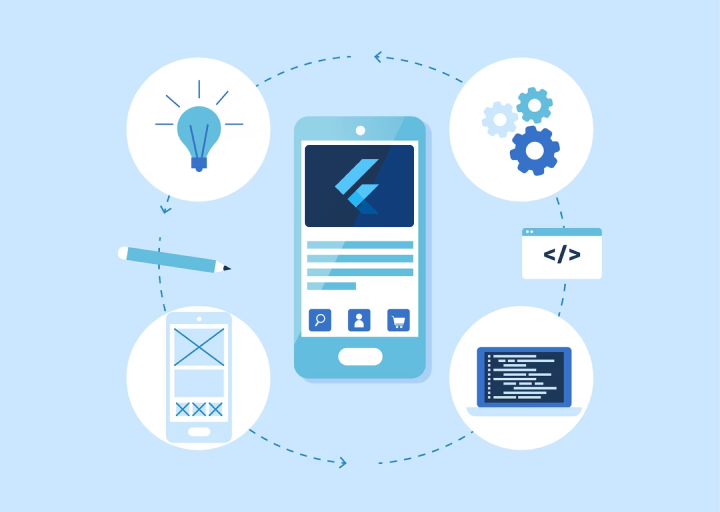In the constantly changing landscape of mobile app development, the decision regarding the selection of the most fitting framework assumes a position of utmost significance. A burgeoning framework that has captured considerable attention in recent years is Flutter. Within the confines of this composition, we shall embark on an expedition through the domain of application development and contemplate the following inquiry: Does Flutter indeed establish itself as a commendable choice for the creation of applications?
Table of Contents:
1. Understanding Flutter
2. Advantages of Using Flutter
3. Use Cases for Flutter
4. Challenges and Considerations
5. Conclusion

Understanding Flutter
What is Flutter?
Flutter represents an open-source User Interface (UI) software development toolkit meticulously crafted by Google. Its primary purpose lies in the facilitation of the creation of natively compiled applications across mobile, web, and desktop platforms, all from a singular codebase. What distinguishes Flutter is its remarkable prowess in fashioning exquisitely enchanting, natively compiled applications, harmoniously harmonizing across a multitude of platforms, all emanating from a solitary codebase.
The Flutter Ecosystem
Flutter offers a robust ecosystem of tools, libraries, and widgets that simplify the app development process. With the Flutter framework, developers can create intuitive user interfaces and achieve high-performance results.
Advantages of Using Flutter
1- Cross-Platform Development
Flutter allows developers to write code once and run it on multiple platforms, such as Android, iOS, web, and desktop. This reduces development time and costs significantly.
2- Expressive and Beautiful UI
One of Flutter’s standout features is its ability to create visually appealing user interfaces. It provides a wide range of customizable widgets that enable developers to craft stunning designs.
3- Fast Development
Flutter’s hot-reload feature speeds up the development process. Developers can see the immediate impact of their code changes without having to restart the entire application.
4- Strong Community Support
Flutter has a rapidly growing community of developers who actively contribute to its development. This means you can easily find resources, plugins, and solutions to common issues.
Use Cases for Flutter
1- Mobile Apps
Flutter is an excellent choice for building mobile apps, whether it’s a simple utility app or a complex e-commerce platform. Its cross-platform capabilities ensure that your app reaches a wide audience.
2- Web Development
Flutter’s adaptability extends to web development. With the help of frameworks like Flutter for Web, you can create web applications with the same codebase used for mobile.
3- Desktop Applications
Flutter’s versatility even extends to desktop applications. Developers can use Flutter to build apps for Windows, macOS, and Linux, further maximizing code reusability.
Challenges and Considerations
While Flutter offers numerous advantages, it’s essential to consider potential challenges:
1- App Size
Flutter apps may have a larger file size compared to native apps due to the need to include the Flutter engine. However, this can be mitigated with proper optimization.
2- Limited Native Features
Some native features and APIs may not be readily available in Flutter, requiring additional development effort to implement them.
3- Learning Curve
If you are entirely new to Flutter, there might be a learning curve. However, the vast Flutter community and extensive documentation can help ease this transition.
Conclusion
Flutter unquestionably stands as a robust framework for crafting mobile applications. Its capacity to deliver a versatile, cross-platform solution adorned with elegant user interfaces and swift development cycles renders it an appealing option for a multitude of developers. Nevertheless, it remains imperative to meticulously assess the benefits in relation to potential obstacles and consider the specific prerequisites of your project. Armed with the correct approach and expertise, Flutter unquestionably possesses the potential to assist you in fashioning exceptional applications that shine brightly in the fiercely competitive realm of mobile and web development.
So, if you’re looking to develop apps that leave other websites behind, consider embracing Flutter and harnessing its full potential.



